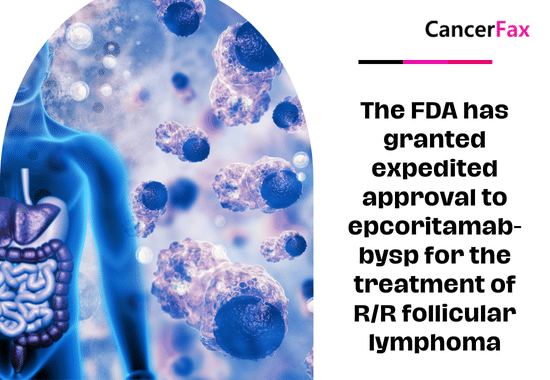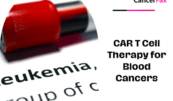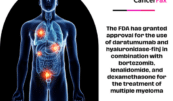June 2024: The Food and Drug Administration has given accelerated approval to epcoritamab-bysp (Epkinly, Genmab US, Inc.), a bispecific CD20-directed CD3 T-cell engager, for adult patients with recurrent or refractory follicular lymphoma (FL) who have undergone two or more courses of systemic therapy.
The efficacy and safety of the treatment were assessed in a clinical experiment called EPCORE NHL-1 (Study GCT3013-01; NCT03625037). This trial was open-label, meaning that both the researchers and the participants knew which treatment was being administered. It comprised 127 patients who had relapsed or refractory follicular lymphoma (FL) after receiving at least two rounds of systemic therapy.
The trial took place at many centers and involved different groups of patients, but all of them received the same treatment. The main measure of effectiveness and safety was determined based on a group of 127 patients who followed a 2-step increase in dosage plan. An additional group of 86 patients was studied to determine the optimal dosage schedule for mitigating cytokine release syndrome (CRS). The recommended approach involved a 3-step increase in dosage.
The primary metrics of effectiveness were the overall response rate (ORR) and duration of response (DOR), which were determined by an Independent Review Committee using the Lugano 2014 criteria. Among the 127 patients in the primary efficacy group, the overall response rate (ORR) was 82% (95% confidence interval [CI]: 74.1, 88.2), with 60% of patients attaining complete responses.
Among the participants who responded to the treatment, the estimated median duration of response (DOR) was not determined during the 14.8 months of follow-up. The confidence interval for the projected median DOR ranged from 13.7 months to not determined (NR). The Kaplan-Meier estimate for the duration of response (DOR) over a 12-month period was 68.4%, with a 95% confidence interval (CI) ranging from 57.6% to 77.0%. The effectiveness was comparable across the 86 patients who underwent the 3-step dosage escalation regimen.
The prescribing material contains a boxed warning regarding the potential occurrence of severe or deadly cytokine release syndrome (CRS) and Immune Effector Cell-Associated Neurotoxicity (ICANS). Important precautions and warnings involve the risk of severe infections and reductions in blood cell counts. The incidence of ICANS was 6.0%, while severe infections occurred in 40% of cases. Out of the 86 patients with relapsed or refractory follicular lymphoma who followed the prescribed 3-step dose regimen, 49% experienced CRS. All of these occurrences were classified as either grade 1 (45%) or grade 2 (9%).
The predominant side effects (≥20%) included local responses at the injection site, cytokine release syndrome, COVID-19 infection, exhaustion, upper respiratory tract infection, musculoskeletal pain, rash, diarrhea, fever, cough, and headache. The most prevalent laboratory abnormalities observed in Grade 3 to 4 cases were a reduction in lymphocyte count, neutrophil count, white blood cell count, and hemoglobin levels, with a frequency of at least 10%.
The suggested treatment protocol is the subcutaneous administration of epcoritamab-bysp in 28-day cycles until there is evidence of disease progression or the occurrence of intolerable side effects. The recommended dosage consists of a 3-step increase schedule in Cycle 1, with doses of 0.16 mg on Day 1, 0.8 mg on Day 8, 3 mg on Day 15, and 48 mg on Day 22. For Cycles 2 and 3, the dose remains at 48 mg on Days 1, 8, 15, and 22. In Cycles 4 to 9, the dose is 48 mg on Days 1 and 15. From Cycle 10 onwards, the dose remains at 48 mg on Day 1.
This application has been granted approval using the fast approval procedure. The therapeutic efficacy of epcoritamab-bysp is now being assessed in a Phase 3 randomized study (NCT05409066), which is nearing completion with a high enrollment rate of 95%. This trial aims to evaluate the effectiveness of rituximab and lenalidomide alone or in combination with epcoritamab-bysp in patients with relapsed or refractory FL.






Bispecific antibody therapy, CD20xCD3 T-cell engager, Epcoritamab-bysp FDA approval, FDA accelerated approval 2023, Follicular lymphoma treatment, Novel lymphoma immunotherapy, R/R FL therapy, Relapsed lymphoma drugs
CancerFax is the most trusted online platform dedicated to connecting individuals facing advanced-stage cancer with groundbreaking cell therapies.
Send your medical reports and get a free analysis.
🌟 Join us in the fight against cancer! 🌟
Привет,
CancerFax — это самая надежная онлайн-платформа, призванная предоставить людям, столкнувшимся с раком на поздних стадиях, доступ к революционным клеточным методам лечения.
Отправьте свои медицинские заключения и получите бесплатный анализ.
🌟 Присоединяйтесь к нам в борьбе с раком! 🌟